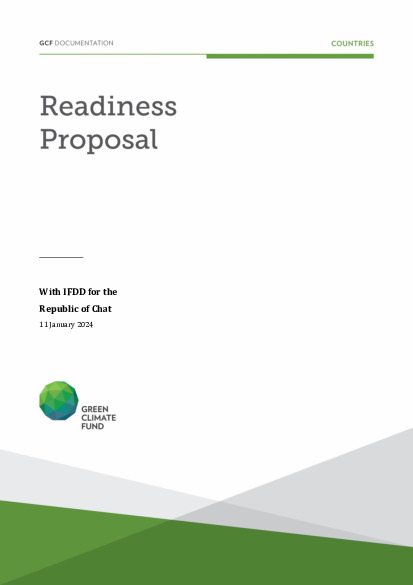Chadian private sector support for low carbon and climate-resilient development

Chadian private sector support for low carbon and climate-resilient development
As a landlocked country, Chad is grappling with security challenges associated with the impacts of climate change, in particular accelerated desertification and the drying up of lake Chad. The country's social indicators remain relatively low, with poverty affecting nearly 42% of the population, predominantly in rural areas. Increased aridification, low yields, and reduced harvests, among other things, are exposing the population's livelihoods to adverse shocks.
Access to financial resources remains one of the challenges to Chad. There are limited public funds to support important sectors such as agriculture, health, education, and energy, with nothing left over for climate change mitigation and adaptation. Therefore, as indicated in its Nationally Determined Contributions, the country struggles to achieve its climate ambition. In fact, since the inception of Chad’s engagement with GCF, no funding proposal dedicated to the country has been approved yet, as all GCF-funded climate projects that have benefited Chad have come from sub-regional initiatives.
Even though the private sector is recognized as a critical partner in achieving the SDGs, the contribution of the Chadian private sector to climate action remains very low due to several barriers. Despite the undertaken initiatives, including the proposal for accreditation of Agence de Développement Economique et Social as a DAE and the launch of the first Call for Project Ideas by the NDA dedicated to accredited entities which are working closely and operating with the private sector to encourage their interest in Chadian private sector opportunities (Readiness CD-RS-004 - Activity 4.2.2); significant barriers impeding the private sector’s contribution to climate action remain.
Chad has the opportunity to unlock private sector resources for climate action; however, the NDA lacks the adequate capacity to design and implement a strategic plan for engaging private sector actors. The significant gaps resulting from the barriers faced by the country are, among others, poor ownership by the NDA of GCF's private sector vision and policies; low effectiveness of the NDA’s private stakeholder engagement practices; lack of a knowledge management system to capture, store, and disseminate lessons learned from private sector engagement practices; and lack of qualified human resources in climate finance
knowledge.
The main objective of this readiness grant is to strengthen NDA's private sector engagement capacity to unlock private sector resources for climate action. To this end, this proposal focuses on Outcomes 1.1; 1.3; and 5.1 of the GCF
Readiness Program. In partnership with the IFDD and based on the results of some activities of Readiness CD-RS-004, such as Activities 1.1.2; 4.1.1; 4.1.2; 4.2.1, and Activity 4.2.2, Chad envisages building the ability of the NDA to establish a better private-sector stakeholder engagement strategy. The direct beneficiaries of this project are the NDA's constituent bodies and other stakeholders to be identified by the incoming report of Activity 4.2.1 of grant CD-RS-004 on private sector landscape analysis as potential actors to be included in the private-sector engagement strategy.